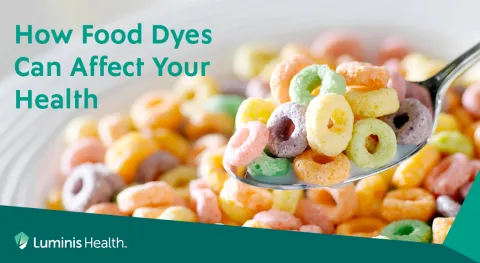Effective January 20, 2026, masks are encouraged for all staff, patients and visitors at all Luminis Health locations and will remain encouraged through the end of the influenza season. Thank you for your patience as we continue to care for our community.

From the start of the COVID-19 pandemic, we knew to be concerned about our physical health. But what we didn’t think as much about — especially since we couldn’t have foreseen the true impact it would have on our lives or the length of time it would last — is how it could affect our mental health. And today, we’re still learning.
In general, we know the disruption we’ve all faced — from fear of the virus and drastic changes to our daily routines to complete isolation — isn’t good for us. And while some effects were already known, others reveal themselves every day.
For example, we’re just now beginning to understand the connections between the pandemic and mental health issues that often plague teenagers, including eating disorders.
Check out these recent observations:
- According to the National Eating Disorders Association, calls, texts and online chats to their helpline increased 58% from March 2020 to October 2021.
- A recent study shows a 25% jump in eating disorder-related hospitalizations for 12-18-year-olds overall.
- Girls 12-18 years old were hospitalized for eating disorders 30% more during the pandemic.
The numbers are clear. And that means parents have a reason to be concerned. Learn more, so you can be ready if your teen needs help.
What are eating disorders?
Eating disorders are serious but treatable illness that affects people mentally and physically — and there are many types. People are most familiar with anorexia nervosa (self-starvation by severely reducing calories to lose weight) and bulimia (purging after eating an excessive amount of food). But other eating disorders can involve binge eating, obsessing over healthy eating, abusing laxatives and compulsive exercising.
What’s behind the jump in eating disorders in teenagers?
The pandemic pummeled teens’ daily routine and structure: Schools closed their doors and extracurricular activities, including beloved sports, came to a halt. But what hit them the hardest? Hanging with friends — a teen’s lifeblood — wasn’t an option (or was limited at best).
Eating disorders are often related to control, so it makes sense that the uncertainty and stress of the pandemic could be a powerful trigger. When life feels turned upside down, someone with a tendency toward disordered eating could easily turn to controlling food — how much, what or when they eat — to feel like they’re in control of something.
For example, stuck at home with less structure and more access to food, teens may binge-eat to deal with anxiety and stress. Then, if weight gain hits, they may go to the other extreme, restricting food and becoming overly focused on exercise.
It’s no surprise: Social media fuels the fire. With school and activities limited, teens turned to their phones to feel connected to someone. They spent more time than ever scrolling through sites such as Instagram and TikTok. And although teens may feel less alone when they’re online, excess screen time exposes them to negative messages.
What are signs of an eating disorder?
Even today, with most schools and activities up and running again, stress and uncertainty still linger. Teens, like everyone else, are trying to live with the reality that COVID-19 is here to stay. Unfortunately, eating disorders continue to be how many teens try to cope.
Changes in your teen’s regular eating and exercise habits are signs your teen may be struggling. Keep an eye out for these signs and take action if you notice:
- Defensiveness about food
- Obsessive workouts
- Preoccupation with counting calories
- Refusal to eat specific categories of food
- Skipped meals
- Sudden weight loss
Also pay attention to what your teen’s saying. For example, comments about food — feeling guilt or anxiety about what they’re eating or not eating — or unhappiness about their body are red flags of a brewing eating disorder.
Know how to help your teen
Talking with teens can be tricky, but it’s the place to start if you suspect they’re using food or eating in an unhealthy way. Be direct and ask what’s going on without launching into a lecture. They’ll be more receptive to discussions in small doses. Focus on your concerns for their health, not body shape or size.
Stumped for what those conversations should cover? Start with:
- Emotional eating. Help your teen understand how food can be a way people deal with emotions. Explain how talking through problems with friends, family or a counselor is a more effective (and healthy) way to cope with a problem.
- Healthy eating habits. Talk about eating when hungry and how to fuel their body to be healthy and strong. Make regular meals together a habit.
- Media messages. Help your teen understand that social media, television shows and movies portray unrealistic (and often “doctored”) body types as normal.
- Positive body image. Ask your teen how they feel about how they look, and explain how healthy bodies come in all shapes and sizes.
Remember, as a parent, you’re setting an example. Practice the attitudes about food, eating and body image you want them to have. Reaching for ice cream for comfort after a tough day at work or bashing your “thunder thighs” every time you put on shorts is a message you’re sending that eventually sticks. You may think your teen isn’t listening or watching, but they are.
Finally, don’t assume eating issues are “just a phase” your teen will grow out of. Research shows dealing with concerns about an eating disorder early and getting professional help are key to successfully treating it. Start by scheduling an appointment with your teen’s primary care provider. Sometimes it takes hearing something from someone other than mom and dad for a message to get through. But it may take more. If so, your doctor can offer the appropriate support or referral your teen needs.
This article originally ran in the Enquirer Gazette.

Lauren Fitzpatrick, MD, medical director, Luminis Health Pediatric Emergency Department.



